
Yuan Shikai was a Chinese military and government official who rose to power during the late Qing dynasty and eventually ended the Qing dynasty rule of China in 1912, later becoming the Emperor of China. He first tried to save the dynasty with a number of modernization projects including bureaucratic, fiscal, judicial, educational, and other reforms, despite playing a key part in the failure of the Hundred Days' Reform. He established the first modern army and a more efficient provincial government in North China during the last years of the Qing dynasty before forcing the abdication of the Xuantong Emperor, the last monarch of the Qing dynasty in 1912. Through negotiation, he became the first President of the Republic of China in 1912. This army and bureaucratic control were the foundation of his autocratic rule. In 1915 he attempted to restore the hereditary monarchy in China, with himself as the Hongxian Emperor. His death in 1916 shortly after his abdication led to the fragmentation of the Chinese political system and the end of the Beiyang government as China's central authority.
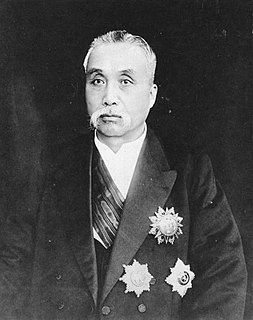
Xu Shichang was the President of the Republic of China, in Beijing, from 10 October 1918 to 2 June 1922. The only permanent president of the Beiyang government to be a civilian, his presidency was also the longest of the warlord era. Previously, he was Minister of the Cabinet of the Imperial Cabinet during the Qing Dynasty.
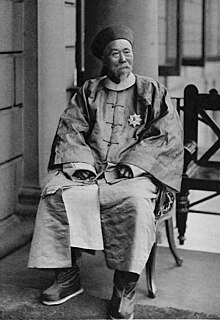
Li Hongzhang, Marquess Suyi was a Chinese politician, general and diplomat of the late Qing dynasty. He quelled several major rebellions and served in important positions in the Qing imperial court, including the Viceroy of Zhili, Huguang and Liangguang.

The Sino-French War, also known as the Tonkin War and Tonquin War, was a limited conflict fought from August 1884 to April 1885. There was no declaration of war. Militarily it was a stalemate. The Chinese armies performed better than its other nineteenth-century wars, and the war ended with French retreat on land. However, one consequence was that France supplanted China's control of Tonkin. The war strengthened the dominance of Empress Dowager Cixi over the Chinese government, but brought down the government of Prime Minister Jules Ferry in Paris. Both sides ratified the Treaty of Tientsin. According to Lloyd Eastman, "neither nation reaped diplomatic gains."
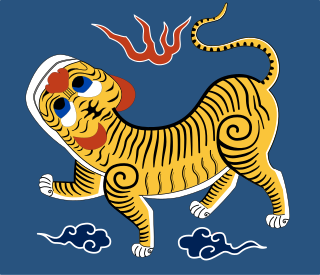
The Republic of Formosa was a short-lived republic that existed on the island of Taiwan in 1895 between the formal cession of Taiwan by the Qing dynasty of China to the Empire of Japan by the Treaty of Shimonoseki and its being taken over by Japanese troops. The Republic was proclaimed on 23 May 1895 and extinguished on 21 October, when the Republican capital Tainan was taken over by the Japanese. Though sometimes claimed as the first Asian republic to have been proclaimed, it was predated by the Lanfang Republic in Borneo, established in 1777, as well as by the Republic of Ezo in Japan, established in 1869.

Liu Yongfu (1837–1917) was a Chinese military figure and commander of the celebrated Black Flag Army. Liu won fame as a Chinese patriot fighting against the French Empire in northern Vietnam (Tonkin) in the 1870s and early 1880s. During the Sino-French War he established a close friendship with the Chinese statesman and general Tang Jingsong, and in 1895 he helped Tang organise resistance to the Japanese invasion of Taiwan. He succeeded Tang as the second and last president of the short-lived Republic of Formosa.

Tang Jingsong was a Chinese general and statesman. He commanded the Yunnan Army in the Sino-French War, and made an important contribution to Qing dynasty China's military effort in Tonkin by persuading the Black Flag leader Liu Yongfu to serve under Chinese command. His intelligent, though ultimately unsuccessful, direction of the Siege of Tuyên Quang was widely praised. He later became governor of the Chinese province of Taiwan. Following China's cession of Taiwan to Japan at the end of the First Sino-Japanese War (1894–1895) he became president of the short-lived Republic of Formosa.

The Black Flag Army was a splinter remnant of a bandit group recruited largely from soldiers of ethnic Zhuang background, who crossed the border in 1865 from Guangxi, China into northern Vietnam, then during the Nguyen dynasty. Although brigands, they were known mainly for their fights against the invading French forces, who were then moving into Tonkin. The Black Flag Army is so named because of the preference of its commander, Liu Yongfu, for using black command flags.

Zhang Zhidong was a Chinese politician who lived during the late Qing dynasty. Along with Zeng Guofan, Li Hongzhang and Zuo Zongtang, Zhang Zhidong was one of the four most famous officials of the late Qing dynasty. Known for advocating controlled reform and modernization of Chinese troops, he served as the governor of Shanxi Province and viceroy of Huguang, Liangguang and Liangjiang, and also as a member of the Grand Council. He took a leading role in the abolition of the Imperial examination system in 1905. The Red Guards destroyed his tomb in 1966 during the Cultural Revolution. His remains were rediscovered in 2007 and reburied with honors.
Li Yannian was a Kuomintang lieutenant-general from Shandong.

Qiu Fengjia or Chiu Feng-Chia was a Taiwanese Hakka−Chinese patriot, educator, and poet.

Song Qing (1820–1902), courtesy name Zhusan, was a Chinese general who served the Imperial government during the First Sino-Japanese War and in the Boxer Rebellion.
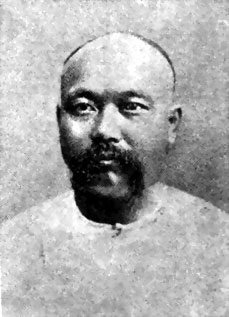
Liu Buchan was a naval officer of the Beiyang Fleet, the most prominent of China's naval units in the late Qing Dynasty. He is best remembered for his actions as commander of the fleet flagship, the Dingyuan, during the First Sino-Japanese War. After his death and the ship being destroyed at the end of the war, he was raised to national hero status in modern China. At his death, Liu was commander of the fleet flagship, with the rank Admiral of the Right, and reserve Admiral of the Fleet.

The Mutual Defense Pact of the Southeastern Provinces was an agreement reached in the summer of 1900 during the Boxer Rebellion by Qing dynasty governors of the provinces in southern, eastern and central China when the Eight-Nation Alliance invaded northern China. The governors, including Li Hongzhang, Xu Yingkui, Liu Kunyi, Zhang Zhidong and Yuan Shikai, refused to carry out the imperial decree promulgated by the Qing imperial court to declare war on 11 foreign states, with the aim of preserving peace in their own provinces.
Late Qing reforms, commonly known as New Policies of the late Qing dynasty, or New Deal of the late Qing dynasty, simply referred to as New Policies, were a series of cultural, economic, educational, military, and political reforms implemented in the last decade of the Qing dynasty to keep the dynasty in power after the invasions of the great powers of the Eight Nation Alliance in league with the ten provinces of the Southeast Mutual Protection in the Boxer Uprising.

The Sino-Japanese War at Sea 1894 is a 2012 Chinese historical war film directed and written by Feng Xiaoning, starring Lu Yi, Xia Yu and others. It is based on the events in the First Sino-Japanese War of 1894–1895, with emphasis on the naval battles and the career of the Chinese naval officer Deng Shichang. The film premiered in China at the International Convention Centre in Weihai, Shandong, on 26 June 2012.
Pan Dingxin was a Qing dynasty governor and military commander of the Huai Army, best known for his role in the Sino-French War.
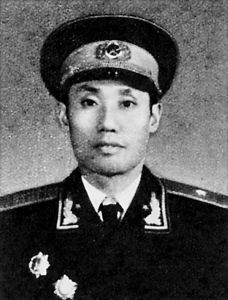
Li Yaowen, born Zhang Xishen (张锡绅), was an admiral in the Chinese People's Liberation Army.

The Taiwanese Resistance to the Japanese Invasion of 1895 was a conflict between the short-lived Republic of Formosa (Taiwan) and the Empire of Japan. The invasion came shortly after the Qing dynasty's cession of Taiwan to Japan in April 1895 at the end of the First Sino-Japanese War.
The Second Revolution refers to a 1913 revolt by the governors of several southern Chinese provinces as well as supporters of Sun Yat Sen and the Kuomintang against the Beiyang Government of the Republic of China led by Yuan Shikai. It was quickly defeated by Yuan's armies and led to the continued consolidation of Yuan's powers as President of the Republic of China.
















